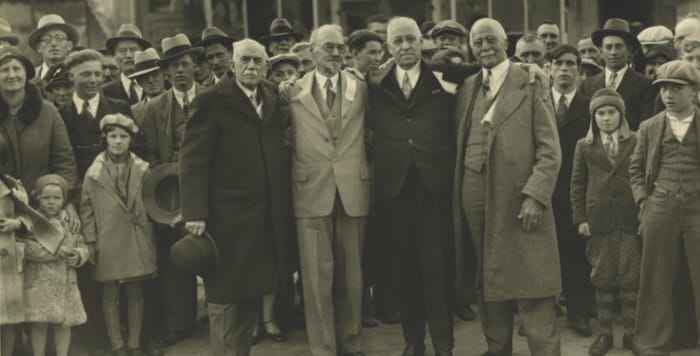Hey there, curious minds! Ever stayed in a hotel room and found a Bible tucked away in the nightstand drawer? Chances are, that Bible got there thanks to the Gideons International. But who are the Gideons, and what’s their story? Let’s dive into the fascinating history of this organization and explore the impact they’ve had around the globe.
History of Gideons International
Founded in 1899, Gideons International started with a simple goal: to encourage fellowship among Christian businessmen and spread the word of the Bible. What began as a small group in Janesville, Wisconsin, quickly blossomed into a worldwide mission.
Initially, their focus was on bringing Christians together, creating a space for support and shared faith. However, they soon realized that their mission could reach far beyond church walls. Recognizing that travelers often seek comfort and familiarity while away from home, the Gideons decided to make hotels their primary target for Bible distribution.
This mission expanded to include hospitals, where patients face uncertainty and fear, and schools, where young minds are open to new ideas. By placing Bibles in these locations, the Gideons hoped to offer a source of comfort, guidance, and hope to those who might need it most.
The Gideons’ work relies heavily on the generosity of local churches and individuals. Working hand-in-hand with evangelical churches, they make sure their efforts align with the Great Commission – the biblical call to spread the Christian message throughout the world. This collaboration has enabled them to distribute over 70 million Bibles annually to more than 200 countries.
What’s even more remarkable is their emphasis on personal stories. Gideons members often share their own faith journeys, speaking about how the Bible has influenced their lives and offering a real-life example of its power. These personal testimonies bring the Gospel message to life, demonstrating that faith isn’t just something found within the pages of a book, but a living, breathing force that can transform lives.
The Gideons International continues to be a strong presence worldwide, quietly making a difference by providing access to the Bible and a message of hope to millions. The next time you find yourself reaching for that Gideon-placed Bible in a hotel room, take a moment to think about the long journey it took to get there and the countless lives it might touch.
What is the Story of The Gideons International?
To understand the Gideons International, we need to go back to their humble beginnings. In 1899, three Christian salesmen – John H. Nicholson, Samuel E. Hill, and W.J. Knights – met in a hotel room in Janesville, Wisconsin. They felt a strong calling to share their faith and recognized that traveling businessmen, often far from home, might be particularly open to spiritual comfort. This led them to focus on getting Bibles into the hands of these men, hoping to offer solace and guidance during their travels.
As time went on, the Gideons – as they came to be known – expanded their vision. They realized that hospitals, schools, and other public spaces could also benefit from having Bibles available. Driven by the belief that everyone deserved a chance to connect with God’s word, they began distributing Bibles in a variety of locations.
Their emblem, a pitcher and a torch with two handles, reflects their mission. Inspired by the biblical story of Gideon, known for his clever tactics and reliance on God, the emblem symbolizes vigilance and readiness to share the message of the Gospel, like a shining light for those searching for spiritual direction.
Fast forward to today, and The Gideons International is a global network operating in over 180 countries. They distribute millions upon millions of Bibles every year, relying entirely on donations and the dedication of their 269,500 members.
Here’s a quick recap of what we’ve learned:
| Feature | Description |
|---|---|
| Founded | 1899 |
| Original Mission | Providing Bibles to traveling businessmen |
| Expanded Reach | Hospitals, schools, hotels, and other public places |
| Emblem Meaning | Vigilance in sharing the Gospel message |
| Global Presence | Operates in over 180 countries |
| Annual Bible Distribution | Millions |
| Funding | Freewill offerings |
| Membership | Approximately 269,500 individuals |
What is The Gideons International Controversy?
While The Gideons International is widely known for its Bible distribution efforts, the organization has also faced its share of controversies over the years. Critics have raised questions about the Gideons’ inclusivity, methods, and influence, sparking debates about religious freedom, the separation of church and state, and the evolving role of religious organizations in a diverse world.
One point of contention centers on the Gideons’ strong connection to American Evangelical beliefs. Some argue that their focus on “decision theology,” which emphasizes the individual’s choice to follow Jesus, may downplay the role of God’s grace. This raises concerns about whether their approach aligns with the beliefs of all Christians or primarily reflects a specific theological perspective.
Their membership policies have also drawn criticism, particularly concerning the historical exclusion of women as full members. While the organization has made some strides in this area, the debate over women’s roles within the Gideons continues to spark internal divisions and raises questions about their commitment to gender equality.
Another point of concern is their singular focus on Bible distribution. While providing access to scripture can be beneficial, some argue that this approach may not be the most effective way to connect with people from diverse backgrounds and beliefs. Critics suggest that a more holistic approach to ministry, incorporating social services, interfaith dialogue, or contextualized engagement with scripture, might be more impactful in today’s world.
Legal challenges have also arisen, with the Gideons facing lawsuits over the distribution of Bibles in public schools. These cases highlight the tension between religious freedom and the separation of church and state, raising complex questions about the constitutionality of distributing religious materials in public institutions.
In a world grappling with increasing diversity and inclusivity, the controversies surrounding The Gideons International underscore the challenges faced by religious organizations navigating a changing social landscape. As the Gideons continue their mission, it remains to be seen how they will adapt to these challenges and shape their approach in the years to come.
What Religious Affiliation are the Gideons?
The Gideons International is an association exclusively for men who identify as Evangelical Christians. Founded in 1899, their core mission has always been to spread the teachings of the Gospel as they interpret it. Think of them as a fellowship of businessmen and professionals united by their belief in traditional Christian teachings.
It’s important to note that the Gideons aren’t limited to a single Protestant denomination. In fact, they are interdenominational, welcoming members from over 20 different Protestant branches like Baptists, Methodists, and Presbyterians. This diversity allows them to present a united front when it comes to spreading their shared faith.
The Gideons’ most recognizable activity is their extensive Bible distribution. They’ve strategically placed Bibles in hotels, hospitals, schools, and even prisons. By making the Bible readily available, they aim to make it easier for people to encounter and connect with the Christian message, potentially leading them towards faith.
To summarize:
- The Gideons are a men’s only group of Evangelical Christians.
- They welcome members from various Protestant denominations, emphasizing shared beliefs over denominational differences.
- Their most prominent activity is the global distribution of Bibles, with the goal of making the Christian message accessible to as many people as possible.
What is the Difference Between the Gideon Bible and the Catholic Bible?
You might have encountered a Gideon Bible in a hotel room or a Catholic Bible in a church. While both aim to share the Christian message, key differences set them apart. It’s like comparing a friendly wave to a heartfelt letter – both communicate but in distinct ways.
The Gideon Bible, often found in public spaces, prioritizes accessibility. The Gideons International, the organization behind it, seeks to make the Bible available to everyone, regardless of their background or religious affiliation. These Bibles often utilize modern English translations for clarity and ease of understanding, making them approachable for a wide audience.
The Catholic Bible, steeped in centuries of tradition, reflects the Catholic Church’s influence. It features a specific translation that emphasizes historical context and theological nuances, connecting Catholics to their faith’s rich history. Unlike the Gideon Bible, it adheres to a specific canon of books, some of which are not included in other Christian traditions.
Another key difference lies in their language. Gideon Bibles favor modern English translations for clarity and ease of understanding. The Catholic Bible, however, often uses an older, more traditional English translation that preserves the historical weight and poetic beauty of the text.
Here’s a table summarizing the key differences:
| Feature | Gideon Bible | Catholic Bible |
|---|---|---|
| Origin | Late 19th century | 16th century |
| Language | Modern English translations | Archaic English translation |
| Content | Often includes study guides and annotations | Adheres to a specific canon of books |
| Purpose | Evangelism and personal inspiration | Liturgical use and shaping Catholic doctrine |
| Distribution | Public places like hotels, hospitals, and prisons | Primarily within Catholic communities and homes |
It’s important to note that biblical scholarship is an ongoing process, with ongoing debates about translation, historical context, and theological nuances. This article offers a general overview, and diving deeper into biblical studies reveals a world of rich history, diverse perspectives, and evolving interpretations.
What Was Gideon’s Sin?
In the Book of Judges, Gideon is portrayed as a reluctant hero chosen by God to deliver the Israelites from Midianite oppression. While initially hesitant, Gideon eventually accepts his calling and, with God’s guidance, leads a small band of Israelites to a miraculous victory against a much larger Midianite army. However, despite his triumphs, Gideon’s story takes a darker turn, revealing the complexities of human nature and the potential for even the most faithful to stumble.
Gideon’s downfall seemingly begins with pride. Having achieved a remarkable victory, he starts to believe his own hype, even asking the Israelites to worship him. This act of hubris directly contradicts the fundamental principle of worshipping only God, a transgression that marks a turning point in his story.
His pride leads him further astray. Upon returning home, he constructs an ephod, a garment typically worn by priests. However, instead of using it for its intended purpose, Gideon places it in a sacred space and begins worshipping it as an idol, a clear violation of the commandment forbidding the creation of graven images.
Gideon’s actions have far-reaching consequences. His pride and idolatry create a chasm between him and God, setting a dangerous precedent for the Israelites, who begin to follow his lead and stray from their faith. This ultimately contributes to their future struggles and underscores the dangers of straying from God’s commands.
Gideon’s story serves as a cautionary tale, reminding us that even extraordinary achievements shouldn’t overshadow humility and devotion to God. It highlights the importance of remaining grounded in faith, acknowledging that true strength and guidance come from God alone.
It’s important to acknowledge that interpretations of Gideon’s story vary, and scholars continue to debate the specifics of his sins and their implications. However, his story undeniably offers a powerful reminder of the perils of pride, the significance of humility, and the importance of remaining true to one’s faith, even amidst success and adversity.
Why are Gideons Allowed to Put Bibles in Hotels?
The presence of Gideon Bibles in hotel rooms is a familiar sight for many travelers. But the reasons behind this practice are surprisingly multifaceted, reflecting a blend of religious beliefs, hospitality norms, and ongoing societal shifts.
For the Gideons, driven by their Christian faith, placing Bibles in hotels is an act of evangelism, a way to make the scriptures accessible to those who might not otherwise encounter them. They envision these Bibles as a source of comfort, guidance, and a potential gateway to faith for travelers far from home.
Hotels, on the other hand, often view it as a gesture of hospitality. Aware that their guests come from diverse backgrounds and hold various beliefs, providing a Bible acknowledges the spiritual needs some might have, without necessarily endorsing a particular religion. This practice can be seen as a way to create a welcoming and inclusive environment for guests of different faiths.
The distribution and replacement of these Bibles come at no cost to the hotels. Gideons International relies entirely on donations from individuals and churches who support their mission. These contributions allow them to purchase and distribute millions of Bibles annually, sustaining their efforts to make scripture widely accessible.
It’s also worth noting that the practice of placing Bibles in hotels is not without its critics. In an increasingly secular and religiously diverse society, some argue that it’s inappropriate to assume all guests would welcome a religious text in their rooms. This has led some establishments to reconsider the practice, opting to offer a wider range of religious texts or information on accessing materials from various faiths.
Ultimately, the next time you encounter a Gideon Bible in a hotel room, remember that it represents more than just a book in a drawer. It’s a tangible symbol of intersecting motivations – deeply held beliefs, acts of generosity, evolving hospitality practices, and a broader conversation about religious representation in the public sphere.
What is Gideon’s Story in the Bible?
In the Book of Judges, Gideon’s story unfolds as a testament to the power of faith, God’s unwavering presence, and the extraordinary feats possible when we embrace our calling, even amidst doubt and fear.
Imagine being a simple farmer, tending to your crops, when suddenly, you’re told you’re the chosen one destined to lead your people to freedom. That’s precisely what happened to Gideon. Tasked with delivering the Israelites from the oppressive Midianites, Gideon grappled with feelings of inadequacy, questioning his ability to fulfill such a monumental calling.
Gideon’s initial doubt is relatable. He asks God for signs, seeking reassurance and confirmation that he’s truly the right person for the job. God, in his infinite patience and understanding, provides those signs, strengthening Gideon’s resolve with each miraculous display.
The story culminates in a thrilling battle where Gideon’s significantly outnumbered troops face the mighty Midianite army. Fueled by faith and guided by God’s strategic instructions, they emerge victorious against all odds. This victory, a testament to God’s intervention, solidifies Gideon’s place as a legendary figure in Israelite history.
Gideon’s story resonates throughout time, offering a timeless message of hope and inspiration. It reminds us that our perceived limitations don’t define us. It’s a powerful reminder that God can use anyone – even those who doubt themselves – to achieve extraordinary things when we surrender to his will and trust his guidance.
Gideon’s journey encourages us to reflect on our own lives. What seemingly impossible tasks is God calling us to embrace? What signs of his presence and guidance are we overlooking in our own journeys? Perhaps, like Gideon, we need to step out in faith, trusting that God will equip us for the journey ahead.
What Did God Change Gideon’s Name To?
In biblical times, names held profound significance. They weren’t just labels but reflections of a person’s character, destiny, or relationship with God. So, when God chose to rename Gideon, it wasn’t a mere formality, but a powerful declaration, a symbolic transformation that spoke volumes about Gideon’s purpose and the divine power backing him.
God renamed Gideon “Jerubbaal,” which translates to “let Baal contend with him.” Baal, a prominent false god worshipped by the Israelites at the time, represented idolatry and a departure from the one true God. By giving Gideon this name, God issued a direct challenge to Baal, effectively saying, “I dare you to challenge him. Let’s see who the real power is!”
This name change profoundly impacted Gideon. Imagine the shift from feeling like an insignificant farmer to carrying a name that boldly proclaimed, “This man will take you on, Baal!” It served as a constant reminder of his mission to lead the Israelites back to God, dismantling the idols they had embraced and reaffirming their covenant with the one true God.
Think of it this way:
| Old Gideon | New Gideon (Jerubbaal) |
|---|---|
| Timid | Courageous |
| Doubtful | Faithful |
| Ordinary Farmer | Powerful Leader |
The name change wasn’t just about swapping words; it was a divine act of empowerment, transforming Gideon from the inside out, equipping him with the courage, faith, and authority to confront both his enemies and the spiritual darkness that had gripped his people. It’s a powerful reminder that God sees our potential, even when we doubt ourselves, and he bestows upon us the strength and guidance we need to fulfill our calling.
Is The Gideons International a Good Charity?
For over a century, Gideons International has diligently pursued its mission of distributing Bibles globally, aiming to make the Christian message accessible to all. This dedication has sparked both admiration and scrutiny, prompting the question: Is The Gideons International a good charity?
On the one hand, their impact is undeniable. Since their inception, they’ve distributed over two billion Bibles worldwide, a staggering number that speaks to their commitment and reach. They’ve provided comfort and inspiration to countless individuals seeking spiritual guidance, demonstrating their dedication to sharing their faith.
The organization prides itself on financial transparency and accountability. Funded entirely by donations, they operate with a clear commitment to responsible stewardship. Their financial records are readily available for public scrutiny, earning them accolades from organizations like the Evangelical Council for Financial Accountability.
Gideons International relies heavily on a network of volunteers passionate about spreading their faith. These individuals are the backbone of the organization, tirelessly working to place Bibles in hotels, hospitals, and numerous other locations. This grassroots approach showcases the sincere dedication of its members and their unwavering belief in the power of the written word.
However, despite their positive attributes, some criticisms have been leveled against the Gideons. Their focus on a single version of the Bible, primarily the King James Version, has raised concerns about accessibility for those unfamiliar with its archaic language. Additionally, critics argue that merely distributing Bibles, without providing context or guidance, may not be the most effective method of evangelism.
Others question the organization’s exclusivity, pointing to their historically male-dominated membership and their alignment with specific evangelical interpretations of Christianity. These concerns highlight the need for greater inclusivity and a more nuanced approach to engaging with diverse communities.
Ultimately, determining whether The Gideons International is a “good” charity is subjective and depends on individual values and priorities. Their commitment to financial transparency, their impressive global reach, and their unwavering dedication to sharing their faith are commendable. However, potential donors should also consider the criticisms leveled against the organization and decide if their approach aligns with their personal beliefs.
What Version of the Bible Do the Gideons Use?
If you’ve ever stayed in a hotel and opened the nightstand drawer to find a Bible, you’ve likely held a Gideon’s Bible in your hands. But have you ever wondered which version of the Bible they distribute? The answer, like many things about this organization, is multifaceted and reveals their commitment to both tradition and accessibility.
While the Gideons distribute a variety of Bible translations depending on the context, the most commonly associated version with their organization is the King James Version (KJV). This historic translation, commissioned by King James I of England in 1611, holds a significant place in Protestant Christianity, particularly among evangelical denominations. Its elegant prose, rich history, and widespread recognition make it a natural choice for an organization seeking to share the Christian message widely.
However, the Gideons also recognize the importance of using translations that resonate with contemporary audiences. For printed Bibles and New Testaments, they primarily rely on the English Standard Version (ESV). This more modern translation, known for its balance of accuracy and readability, attempts to stay true to the original languages of the Bible while using language that’s accessible to contemporary readers.
The choice of which version to distribute often depends on the specific context. The KJV’s historical significance and enduring popularity make it a fitting choice for the Gideon’s Bible, aiming to offer a familiar and widely respected text to those encountering it in a hotel room. The ESV, on the other hand, with its emphasis on clarity and accuracy, might be chosen for distribution in settings where a more modern and accessible translation is deemed appropriate.
Ultimately, The Gideons International’s approach to Bible translation reflects their desire to reach a broad audience with the Christian message. They recognize the importance of using translations that resonate with diverse readerships while remaining true to their own theological commitments.
Looking to delve deeper into the fascinating history of Folgers coffee, a brand synonymous with morning rituals? Or perhaps you’re curious about the history of Frankoma Pottery, renowned for its unique artistry. If Texas lore captivates you, explore the history of Gruene, Texas, a town steeped in music and heritage.
- How many feet is 300 meters? 984 Feet: Understand Length Conversions Easily - March 31, 2025
- Senior at What Age: Benefits & Eligibility Guide - March 29, 2025
- Unlocking Senior Benefits: How Old is a Senior? Your Complete Guide - March 29, 2025
















